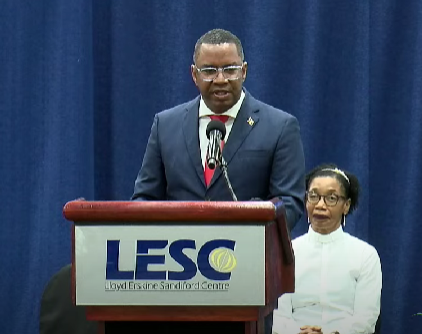Democratic Labour Party Defended by Democratic League of Women Amid Resignations: An Overview

September 4, 2024
Accusations of misogyny within the Democratic Labour Party are refuted by the Democratic League of Women, citing a proud track record of empowering women despite recent resignations and internal turmoil.
As the Democratic Labour Party faces accusations of misogyny following the resignations of three prominent female members, a group of women within the party has come out strongly in defence of the DLP.
In a statement released late Tuesday, the Democratic League of Women refuted claims that the party sidelines or shows contempt for women, insisting that the DLP has a “proud track record of improving the lives of women”.
The group’s statement comes in the wake of resignations by former Senator Tricia Watson, former parliamentary secretary and senator Irene Sandiford-Garner, and Stacia Browne who led the women’s league, following a chaotic party conference held recently.
While the women were not named in the statement, the Democratic League of Women addressed their resignations and the developments at the conference, describing the events as “a deliberate state of disorder aimed at destabilising the organisation’s legitimate authority”.
The group claimed that this disruption was orchestrated by two expelled male members and was condoned by female members of the party who “ought to know better”. The league pointed out that two of the three women had been members for less than three years and had assumed leadership roles in the party despite having limited knowledge of the organisation.
“There will be more resignations,” the statement read. “Actions have consequences, no matter the gender or social standing of those involved. We subscribe to the rule of law. Despite obvious transgressions, attempts are now being made to blame the institution and to paint it as misogynistic. . . We reject these assertions and repeat–actions have consequences no matter the persons involved.”
The Democratic League of Women insisted that while some may focus on the grievances of the departing members, the DLP does not sideline or show contempt for women. The group pointed to the party’s historical achievements in elevating women to leadership positions and enacting legislation that has significantly benefited women and families across the nation.
“We in the Democratic Labour Party refuse to accept the label that the party we love and support is misogynistic,” the statement continued. “We reflect, with pride, on the many women who were afforded the opportunity to serve at higher levels nationally and the many who, though unsuccessful at the polls, offered themselves to be representatives of the people.”
The statement highlighted several prominent women who have served the DLP and the country, including Hazeline Odessa Gittens, the first woman appointed to the Senate and as a parliamentary secretary; Gertrude Eastmond, the second woman elected to Parliament; Sybil Leacock, the nation’s second female senator; former St John MP Mara Thompson; and Kerryann Ifill, the first woman president of the Senate.
The women’s league also cited landmark legislation enacted by the DLP in support of families and households, including the National Insurance and Social Security Act (1967), Severance Payments Act (1971), Education Act (1975), Family Law Act (1975), Succession Act (1975), Employment of Women (Maternity Leave) Act (1976), Domestic Violence (Protection Orders) Act (1992), and Employment Rights Act (2012).
In contrast, the group criticised the Mottley administration, arguing that it has failed to implement policies that meaningfully protect women and children from the economic challenges posed by the ongoing IMF programme.
“Crime continues to be rampant, social services continue to be undermined, and living continues to be uncertain,” the statement said. “The members and supporters of the DLP expect the focus to be kept on the actions of this government. How are they using their power? Whose lives are being made better, and whose are being made worse?”
The Democratic League of Women urge Barbadians, particularly women, to focus on the broader issues facing the country, rather than the grievances of what it termed a few disaffected individuals.
“There is a much bigger picture than three disaffected women who are free to decide whether they stay with or leave an organisation,” the party’s women’s arm said. “It is on the bigger picture that we encourage all Barbadians, especially women, to focus.” (SD)


